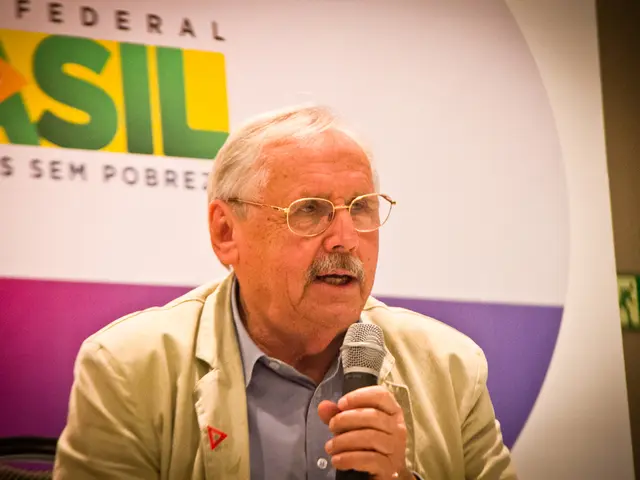A Fresh Start for South Korea: The Presidency of Lee Jae Myung
Progressive politician Lee Jae Myung secures the presidency of South Korea.
In Seoul, liberal opposition leader Lee Jae Myung has clinched the presidential election, edging out conservative candidate Kim Moon Soo by a significant margin. With a staggering 79.4% voter turnout, it appears South Koreans are craving a shift in political direction.
Under the shadow of former president Yoon Suk Yeol's state crisis, South Korea seems eager to move forward. Critic of Yoon, Lee promises a political reboot. His foreign policy centered on diplomatic reconciliation with North Korea and China, sustainable energy, AI investments, and championing worker's rights.
Lee, the son of a poverty-stricken family, has climbed the ladder of success with grit and determination. Born as the fifth of seven children, his birthdate remains uncertain due to his father's delay in registering him. Despite a troubled teenage life filled with factory work and injuries, he later emerged as a human rights lawyer and accomplished politician.
Uncharted Waters Ahead
While popular among leftists, Lee Jae Myung is not without controversy. Facing legal scandals up until his election, his presidential tenure brings forth formidable challenges. Economic headwinds loom, with South Korea experiencing a minor GDP contraction in Q1. External threats to South Korea loom with Trump's looming tariffs, while internal divisions, including rifts between ideological camps, generational divides, and gender disparities, dominate the domestic landscape.
Ties with China and North Korea
As a leader, President Lee is likely to pursue cautious engagement with China, prioritizing economic goals and balancing alliance expectations, especially regarding U.S. concerns about de-risking from China [4]. Lee's foreign policy also signals a return to communication with North Korea, aligning with a step-by-step approach toward denuclearization [1].
Leaning toward a pragmatic and post-ideological stance, Lee's foreign policy is driven by economic priority and alliance maintenance, positioning South Korea as a key actor in the evolving regional dynamics [3]. Lee's foreign policy\, if implemented, may test trilateral cohesion with the US and Japan, particularly regarding North Korea [4].
- Lee Jae Myung, the newly elected president of South Korea, faces a challenging political landscape marked by economic headwinds and internal divisions.
- His presidency comes under the shadow of former president Yoon Suk Yeol's state crisis, with South Koreans craving a shift in political direction.
- Lee Jae Myung's foreign policy aims to prioritize diplomatic reconciliation with North Korea and China, focusing on sustainable energy, AI investments, and championing worker's rights.
- Born as the fifth of seven children, Lee Jae Myung, the son of a poverty-stricken family, has climbed the ladder of success with grit and determination.
- Despite a troubled teenage life filled with factory work and injuries, he later emerged as a human rights lawyer and accomplished politician.
- The economic challenges ahead include South Korea experiencing a minor GDP contraction in Q1, with external threats such as Trump's looming tariffs.
- Internal divisions, including rifts between ideological camps, generational divides, and gender disparities, dominate the domestic landscape.
- As a leader, President Lee is likely to pursue cautious engagement with China, prioritizing economic goals and balancing alliance expectations, especially regarding U.S. concerns about de-risking from China.
- Lee's foreign policy also signals a return to communication with North Korea, aligning with a step-by-step approach toward denuclearization.
- Leaning toward a pragmatic and post-ideological stance, Lee's foreign policy is driven by economic priority and alliance maintenance.
- South Korea's diplomatic efforts may test trilateral cohesion with the US and Japan, particularly regarding North Korea.
- Migration, personal-growth, and education-and-self-development can be the cornerstones for overcoming Lee Jae Myung's initial challenges as president.
- Mindfulness and goal-setting exercises can help President Lee manage stress and stay focused on his ambitious agendas.
- Career-development and skills-training programs can empower Lee Jae Myung's administration to effectively address domestic and foreign policy issues.
- Productivity in the public and private sectors can improve South Korea's economic outlook during challenging times.
- Policy-and-legislation reforms can help alleviate internal divisions and promote social equality.
- The job-search process can be streamlined to boost employment opportunities for the growing South Korean workforce.
- General-news outlets play a critical role in shaping public opinion during Lee Jae Myung's tenure, with their coverage impacting public trust and support for the government.
- Crime-and-justice initiatives can contribute to a safer and more secure South Korea, reducing instances of car-accidents and improving the overall quality of life.
- Fires and accidents can devastate communities, requiring prompt response and careful prevention strategies from local and national authorities.
- Policy-and-legislation addressing climate change can help reduce the impact of fires on South Korea's natural and urban landscapes.
- Mixed-martial-arts can serve as a platform for personal growth and self-development, with the potential to attract more South Korean athletes to the sport.
- Soccer, football, basketball, baseball, hockey, golf, tennis, basketball, and more can provide opportunities for sports-betting enthusiasts and encourage teamwork and competition among South Koreans.
- Premier-league matches, American-football games, NASCAR races, Champions League matches, and other European leagues can foster a sense of global connectedness for South Koreans, promoting a collective spirit during Lee Jae Myung's presidency.








